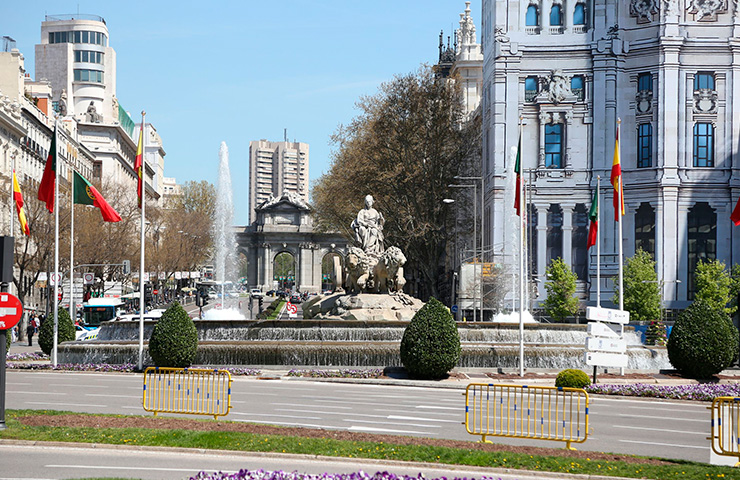02/02/2022
As the financial world changes at the hands of tech and digital advancements, new hubs are coming to light. With its future-focused appeal, Madrid may soon become one of Europe’s financial powerhouses.
The world of finance is evolving. While fintech and global uncertainty have had a huge impact on how finance is done, we’re also seeing changes in where finance is done. Finance today is moving beyond one or two key “hubs”—and it shows signs of a future even more far-reaching.
The pandemic has shown us that it’s now possible to manage complex financial transactions remotely. As we shift away from trading floors and stock exchanges, the digital era is redefining the sector’s geographical limits. However, that doesn’t mean that banks are gearing up to do away with financial hubs completely. The locales of modern finance are expanding across the globe. This means more cities are set to become key locations for the industry. With its business buzz and strategic strongholds, Madrid is chief among them.
Seismic shifts in the world of finance
Technological advancement is the single most important driver of the changes we’re seeing around us today. This is also true for finance, an industry that has been at the forefront of technological innovation for decades.

Nowadays, developments in fintech and communications have altered traditional flows of information and assets.
There’s a lot that can be done in finance—and even enhanced—by making use of the latest tech. That lessens the importance of centralized global hubs.
The tightening of financial regulation has been another powerful trend. Before compliance became fundamental to finance, in-person interactions were the most common channel for transactions, typically taking place in iconic locations like Wall Street and the London Stock Exchange.
The crisis of 2008 sparked a revolution in regulation. Today, the need for monitoring is widely understood—something that’s a lot harder to do when deals are being struck on a busy trading floor. As a result, financial institutions today use electronic platforms and digital monitoring to meet compliance protocols, adding a new layer to the industry.
Offices aren’t disappearing—but they are expanding in Madrid’s financial center
Of course, major banks still want finance professionals to do some of their work in offices. As long-term players in a competitive industry, banks will continue to see the value of the motivation, supervision and communication that comes from in-person work. The difference is these sites no longer need to be in New York or London. With a strong digital and tech strategy, finance teams can easily be in offices at different locations.
In fact, diversifying office locations has numerous advantages. Aside from giving employees increased flexibility and fostering loyalty among tighter-knit teams, creating a broader geographical base establishes presence in several markets.
The appeal of European cities is particularly strong, offering a transparent regulatory environment and vibrant business culture.

All of this means it’s no surprise that major banks are starting to look beyond London and New York, splitting into smaller units across continents and countries. With Goldman Sachs CEO David Soloman recently warning that New York might struggle to maintain its historic top-spot, it seems likely that smaller, alternative hubs could soon change the shape of the financial world map. This is what makes the Madrid financial center more relevant than ever.
Spotlight on Madrid: an up-and-coming financial hub?
While Madrid is often hailed as a haven of culture, history, and fashion, it hasn’t traditionally been a notable destination for finance. That, however, is changing in this new chapter for the industry. The Spanish capital has been climbing up in the Global Financial Centers Index over the past years, where it’s now ranked at #24 globally. This standing makes it the fifth most important financial hub in the European Union, meaning banking giants will likely be looking to Madrid for their next phases of expansion.
What’s more, Madrid’s financial landscape is diversifying. Today, it has larger foreign exchange flows than ever before, which tells us that it’s becoming all the more international. Plus, Madrid is actively investing in business excellence. As part of Madrid’s Municipal Plan for Recovery, the local government is pouring capital into the advancement of SMEs, with an investment worth €86 million.

That will mean funding for digitalization of small businesses and additional liquidity, a fact that is bound to stimulate Madrid’s financial market.
Add to that the strategic importance of Madrid, which certainly won’t be lost on finance’s top decision-makers. As the European market enjoying most financial integration with Latin America, you’ll have connections with powerhouse economies of the future. These close ties will undoubtedly capture banks’ attention as they look forward, building teams in new financial hubs.
Study where the future of finance is happening
As the map of financial cities expands and Madrid emerges as a modern hub, tomorrow’s financial professionals must take advantage. The Spanish capital isn’t only a great financial destination, it’s also a place to get a first-class finance education. Madrid is our home, and IE Business School is a world-renowned institution that trains the finance, business, and tech leaders of the future.
For those looking to build a name for themselves in an up-and-coming financial center, studying in Madrid is a smart step to take. When you study with IE Business School, you’ll be on the doorstep of the Madrid financial district.

Finance is a global game—but gaining localized insights about the market will set you ahead of the competition. Plus, expanding a local network as you study is a great for charging your career before entering the industry.
Madrid also boasts a vibrant international atmosphere, which we capture on the IE University campus with a student body made up of over 160 nationalities and faculty hailing from every corner of the globe. Madrid is a fantastic place to become a truly global citizen. This is a place where you’ll learn from diversity and see the world through the eyes of many. An international outlook is fundamental to the way we teach.
IE Business School has a world-class offering for tomorrow’s finance professionals: the globally top-ranked Master in Finance. The program prepares you for a career in finance with exploration of modern markets, fintech and a global network. Our leading expertise and reputation means we can prepare you for any ambition you may have—whether it’s qualifying with the CFA or landing a traineeship with a leading financial institution.
The future of finance is an ever-changing picture—but Madrid is certainly becoming a bolder point on the map. As the industry is reinvented by new impulses, aspiring financial professionals should situate themselves in the turf of change. Madrid’s doors are wide open.








